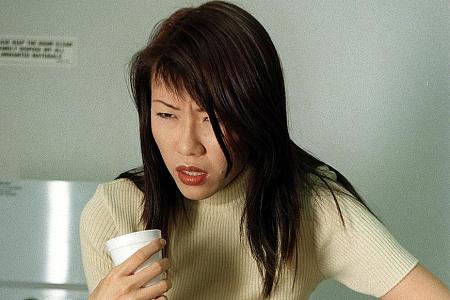Frequent tummy issues? Check for IBS
1 in 5 S'poreans has irritable bowel syndrome, figure is steadily rising
Stomach issues make for some awkward situations.
But it is one thing to be down with an episode of food poisoning for a few days, and quite another altogether if this sounds like a normal day in your life.
Suffering from continual bouts of diarrhoea, bloating, cramping, indigestion or constipation is not normal, and may be an indication that you have irritable bowel syndrome (IBS).
A 2016 study published in the Journal of Neurogastroenterology and Motility found that one in five Singaporeans suffers from IBS. And that figure has been steadily rising.
Dr Reuben Wong, a gastroenterologist at Gleneagles Hospital, attributes the rise in prevalence to greater awareness about the condition.
"Previously, patients with IBS were often diagnosed as simply having gastric problems. Some patients then did not seek further medical attention as they were told that their symptoms were 'normal' or 'stress-induced' when they were really suffering from IBS."
So how is IBS different from an occasional tummy discomfort?
Dr Wong said IBS is a chronic functional gut disorder.
This means the symptoms have to be present for at least the last six months on a regular basis - unlike that of a normal stomachache that comes and goes - and functional in the sense that all your organs are physically healthy, yet things still are not quite right when it comes to your toilet habits.
Because of that, IBS can be difficult to diagnose.
There is no one medical examination or scan that can diagnose it. The most common symptoms of IBS are abdominal pain or discomfort associated with a change in toilet habits, such as stool consistency or frequency.
For your doctor to make an accurate diagnosis, he will usually take a look at your medical history, personal profile (like lifestyle habits) and symptoms.
Your doctor may also send you for further tests to rule out conditions such as inflammation, cancer or stomach ulcers.
As for why it happens, unfortunately, nothing is straightforward when it comes to IBS.
Though it is common, there is no clear cause of the disease.
Dr Wong said IBS is caused by multiple factors and can afflict patients of any age. Furthermore, the causes affect every individual differently.
He said: "Whether someone develops IBS depends on one's genes and personal and environmental factors. It does not occur overnight or solely because of a single factor."
ANTIBIOTICS
IBS can be caused and worsened by the following: severe gut infections such as a bad case of food poisoning; an imbalance in gut flora; mental health issues such as uncontrolled stress or anxiety; certain medications such as antibiotics; and even food.
"Certain foods such as chilli and Fodmap foods - short-chain carbohydrates that some people have trouble digesting - can trigger symptoms," said Dr Wong.
When foods high in Fodmap cannot be digested properly, they ferment in the intestines and produce excess gas that causes discomfort.
As for chilli, a study published in the Neurogastroenterology journal found IBS patients have a greater number of a special receptor in their gut that reacts to capsaicin, a key active ingredient that makes chilli spicy.
While IBS is not curable, the condition can be managed.
But first, Dr Wong said it is important to recognise that IBS is a chronic condition.
"Failure to do so often results in patients getting unnecessarily worried and seeking unneeded tests and investigations," he added.
"The second thing to note is that the treatment of IBS is unique to each individual. Speaking to your doctor can help determine which aspect of the condition needs to be addressed.
"For example, he or she may recommend a diet change or medication, depending on the severity of the symptoms."
For those with milder symptoms, taking medicine to manage the condition can be helpful.
Those who experience loose stools can benefit from taking anti-diarrhoea medication, and those who have constipation can find relief in laxatives.
Your doctor might also prescribe probiotics to rebuild healthy gut flora.
Identifying what food your gut reacts to is another key way of managing IBS.
In general, it is a good idea to cut down on caffeine, alcohol, oily and processed foods, dairy, and foods such as beans and legumes that cause gas and bloating.
Many IBS sufferers also benefit from sticking to a low-Fodmap food diet, and multiple studies have shown that doing so helps to increase the quality of life among patients.
Get The New Paper on your phone with the free TNP app. Download from the Apple App Store or Google Play Store now



